- Home
- Chuck Wendig
Vultures Page 18
Vultures Read online
Page 18
“Oh, so now you chose me.”
Another laugh. “I did.”
“I thought you were on the side of free will.”
“Oh,” Not-Wren says, feigning innocence. “I am. I am the avatar of free will—you’re the one choosing the path, Miriam. Sometimes, I . . . plant signs along the way to help you through the dark, though.”
Another step forward. The tip of the knife blade is only inches away from Wren’s chest.
“I choose the path away from you. I’m getting closer. Closer to shutting you out. To closing the door.”
“Are you, though? You think you’re walking into the light, but you could just be walking into the fire. You’re fumbling with your clumsy fingers, thinking you’re untying the knot, when really you’re just pulling the rope tighter.”
Again, Not-Wren steps forward.
Now, the tip of the blade is just against her middle. Against the soft middle, underneath the gentle V of her ribcage.
Miriam knows it’s not real. No—that’s not it.
It’s real, just not tangible.
The Trespasser is an intrusive phantom. A creature of lies. Insubstantial as a bad dream. But right now, the way the knife presses against Not-Wren’s skin—it has pushback, it has presence, she can feel the subtle, springy bounce of the blade not-yet-sinking into the flesh. Flesh that isn’t real but that damn sure feels real.
“You want to know the trick?” Not-Wren asks.
“Fuck you.”
“The trick is, you are the architect of your own undoing, Miriam. You stand there, saying never again as you set up another winding trail of dominoes, saying I won’t knock them over this time, and then you do—and it’s not an accident, you don’t nudge the dominoes with a heel, you don’t bump into them with your elbow as you’re setting them up. You line them all up, nice and neat, thinking that this time you’ll keep them standing, and then off you go again! To the front of the line, where you put out your hand, tuck back your finger, and flick the lead domino once again, and there they go, clickety-clacking against one another—”
Fuck this.
Miriam stabs forward with the knife.
Her elbow urges the blade forth, and it sinks in deep—the sensation is grotesquely satisfying, like pushing her thumb into soft, warm bread; like easing a foot down into cool clay; like urging her finger deep into Gabby’s wetness, a delicious, penetrative thrust—
She looks up to meet Not-Wren’s eyes.
But that’s not whose eyes she sees.
It’s her own.
She’s standing there, arm out, blade buried into her own middle. Miriam—no, Not-Miriam—opens her mouth, agape, and all that emerges is a mousy, panicked squeak.
“Wh . . . why?” Not-Miriam begs.
“I . . . I don’t . . .”
Then Not-Miriam smiles. “And the dominoes fall.”
Then the Trespasser is gone.
And for a moment, Miriam is alone in the darkness, with only herself and the silence and the gleam of the blade in her hand. But then something twists up in her middle: a knot tightening so hard, the thread begins to fray. Then whatever it is, it breaks—like a twig snapping, like a snow globe breaking and spilling out all that was inside it.
“No,” she says, her voice small.
She feels the wetness down there, spreading. I pissed myself, she thinks, but when her hand falls to the space between her legs and returns, it’s slick with red. Her limbs start to wobble, gone weak.
“No, no, no,” she says, pleading with whoever will listen.
The knife falls from her hands.
She cries out for Gabby as she falls to the kitchen floor.
FIFTY-ONE
ANOTHER BROKEN SNOW GLOBE
She keeps saying it again and again: “It’s dead. The baby is dead. I can’t feel it. I can’t feel her in there.” Miriam lies there in the hospital bed, hands holding on to the cold metal bedrails so hard, her fingertips buzz with encroaching numbness. Gabby soothes her, brushing hair out of her face, rubbing her arms and her shoulders. She’s telling her that it’ll be okay, that Dr. Shahini is on her way, but Miriam already knows what’s coming:
The baby is dead.
The Trespasser killed it.
She says this: “The demon did it. It killed my baby.”
“You don’t know that. Your little girl is supposed to live—your vision should tell you that.” Gabby does not further that thought, but Miriam understands: her vision of the child’s demise comes upon birth, roughly nineteen weeks from now. But Gabby doesn’t get it.
“The Trespasser isn’t like people. It’s like me. It can change fate, I think. It can kill my baby early. It can take you from me early, too.”
“You don’t know that,” Gabby says in a lowered voice, as if recognizing how absurd all of this sounds. “If the Trespasser could change fate, it wouldn’t need you.”
“It’s gaining power, though. It’s . . . changing.”
“We’ll figure it out, for now—”
The door to the room opens, and in walks Shahini with a resident.
Shahini stares down with her dour, severe face and says:
“Subchorionic hematoma.”
“What does that mean? Is my baby okay? What happened to the—”
“The baby is fine.” The resident wheels in an ultrasound machine. The goop goes on the belly. The wand presses there, rolling against the growing roundness of Miriam’s middle. And then Shahini shows her: sure enough, there is her little girl, curled up around her own body, a human cashew.
She’s sucking her thumb.
Miriam almost laughs. A mad sense of relief fills her. She didn’t want this baby at first. Then she wanted her, just to escape the shackles of the Trespasser and to honor Louis—her desire to see the child live was unabashedly selfish. But in this moment, she wants the child to live. Not for any other reason than because the baby is hers, and she loves her daughter.
Shahini points out pockets of dark matter on the screen. “This is blood. You had a mild placental hemorrhage. It . . . happens. Sometimes, it’s a sign of a larger problem, potentially an infection or injury, but—whatever it was, your body has already healed it.”
A mad thought skitters through Miriam’s mind:
Thank you, Harriet Adams.
“You may,” Shahini continues, “experience some more bleeding or spotting for the next week or two, but nothing serious, I don’t expect.”
“You’ll be there, right?” Miriam asks.
Shahini raises one of her considerable eyebrows. Her lashes flutter with a kind of dubious confusion. “Be where, and when?”
“You’re the one who will deliver this baby.”
“I will, for as long as you remain my patient.”
“Good.” Because, Miriam thinks, I trust you. It’s an odd feeling, because truly, she trusts almost no one in this world, especially now with the life of her baby. Gabby, yes. Steve, maybe, okay. Guerrero and Anaya, not at all, not anymore. Shahini, definitely.
And Wren, too—
That is a puzzling thought. One she does not invite, but there it is, like a vampire waltzing into her house anyway.
Wren, who killed Louis.
Wren, who was a pawn of the Trespasser too.
Wren, who has killed so many.
Why would she trust her? A part of her misses her, though. It was seeing the Trespasser appear as Wren. Maybe Wren is like the daughter you fucked up. Maybe this one, the one in your belly right now, can be the one you save. The one who stays good. Who doesn’t turn into you.
“Thanks,” Miriam says to Shahini, lost suddenly in her own mind.
“Go home, get some rest,” the doctor advises. Then she turns, heel to toe, and walks out.
FIFTY-TWO
ACCELERATING TOWARD DISASTER
Back at the condo. It’s 4 AM. Neither of them are sleeping. Miriam sits propped up against the headboard with a lot of pillows. Gabby brings in a glass of water, urges her to drink
it, which she does.
“Maybe we need to call off the plan,” Gabby says.
“No. I don’t know. Shit.”
“You probably shouldn’t even go in tomorrow.”
“I’m going in.”
“Miriam, after today—”
“I said I’m going in. And the plan is still on.”
Gabby sits next to her. “Listen. You heard Shahini. She’s your OB, long as you stay her patient. If you . . . mess with Guerrero, if he drops you from that plan, she’s gone. You’ll end up with whatever ER doctor is on duty, and . . . then what?”
“The Trespasser was sending me a message, Gabby. It came to me. It looked like Wren. And then it . . . did something to me. I don’t think it was going to kill the baby; I think it was letting me know it can. Or it could. When this kid is born, when she comes into the world, I think it’s the Trespasser that kills her. Just as I think it’ll be the Trespasser that kills you.” Her hands ball up into fists. “That fucker told me that I have free will, that it just . . . points me toward the path. I think it burns down all the paths it doesn’t want me to take so I go where it wants. And I’m tired of doing that. I need the name of that medium. I need to know what I’m dealing with.”
“There have to be other mediums in this town. Christ, I bet they have Yelp reviews and everything—”
“And they’re not the real deal. None of them are like me. I need real psychics, not a bunch of greedy little fuckbabies who are fleecing Beverly Hills housewives. They’re all going to pretend to be real, but not a one of them will be.”
Gabby nods. She’s not on board; Miriam can see that. But she must know not to push. Miriam’s heels are dug so far in, she’s up to her neck.
“The plan is on,” Miriam says again, saying it louder this time as if to make it sound like a good decision and not the very bad one it probably is.
FIFTY-THREE
THE CLOCKWATCHER
THE NEXT DAY.
Miriam’s queasy and tired. She sits in the trailer, at a desk. What little sleep she got before coming into work today was plagued by nightmares: not the living nightmares of the Trespasser but garden-variety anxieties, unsheathed and ripped from their cocoons, a parade of crawling worms and snakes. Gabby, dead, her face broken into pieces like a shattered clay pot. Her daughter, pulled from her womb and dropped into a trash bin as a red Mylar balloon floated over Miriam’s body. Louis, a gunshot cratering his temple, suddenly looking up with one eye gone yellow and sickly, the other staying white because it’s fake, and he whispers her name and asks her why she let him die. Then there’s Wren. Standing astride it all. The gun still in her hand. She says she’s sorry even as she points the gun at Miriam.
So, she’s not just bone-weary from the events of the night before, but she’s soul-tired, too. Like her body and her soul were both dragged behind a speeding car over a rough and ragged road.
She glances at her watch: a calculator watch she’s worn on and off since the old days, the scavenger days, her vulture days. It’s beat to hell, the watch. So scratched and chipped you can barely read the time on it. Those days of seeing how people were going to die, then ripping off their corpses and running for the hills, pockets flush with cash and credit cards and whatever else she could steal from the carcass. The watch was one such plunder.
T-minus thirty-seven minutes.
In thirty-seven minutes, the Motherfucking Plan begins.
It ain’t much of a plan, but it’s what they have.
In the meantime, it’s a day of treading water. She knew this going in: it’s a Monday, and Guerrero explained that today meant forming a new plan, setting up more meetings, more handshakes. Which more or less means he’s doing it—the man is on a tear, buoyed by the anger and desperation born of having suffered another dead actor just last week. Today being a day of treading water is essential, in fact, for the Motherfucking Plan.
It means, though, that the minutes crawl by like a gut-shot old man dragging himself across broken glass.
Guerrero sits on his computer. Then he’s up again and looking at crime scene photos. Then back at the computer, and his phone, and up again to the table. He’s agitated. It’s like watching a fish in a fish tank go back and forth, picking up pebbles and moving them from one end to the other. All the while, he keeps throwing her these looks.
Little, flitting glances.
Eyes narrowed.
Lips in a firm, conservative line.
She knows the look. Her mother used to make it.
“You’re disappointed in me,” she says out loud.
He halts his reiterative movement and stiffens. “Excuse me?”
“I see the looks you’re giving me. I know your deal. You’re disappointed in me, David Guerrero.”
At that, the door to the trailer opens, and in walks Julie Anaya. She’s got a latte. She doesn’t do Guerrero’s “pour-over” nonsense, she said; she likes steamed milk and espresso. Miriam did her old line then: I like my coffee like I like my men, hot, black, and coming down my throat, but that didn’t earn her any favors. She didn’t even get a tiny little smirk. Just disdain and silence. No fun, these people. No fun at all.
Guerrero continues, even as Julie gives him a curious side-eye. “To be honest, I am disappointed. We’ve lost two more on your watch.”
“My watch? It’s your watch. It’s the whole FBI’s watch. I’m just a consultant, big guy. I consulted. I’ve given you actionable information that, in two months, that vapid piss-boy Taylor Bowman will get his face sliced off in some office back room.”
“And where is this back room? Where’s the office?”
“I don’t know. You’re supposed to be Sherlock. Don’t you have other psychics to help you out?”
He says nothing. Worry scratches at the back of her head like rats in the wall: Does he have other psychics? Does he really have a name to give you? Or is he just dangling a lie as bait to get you on the hook?
Finally, he says, “Nobody with any skill in this regard.”
“Fine, so, that day, you just put a detail on Taylor Bowman. You follow him. He’ll lead you right to the killer.”
“That’s in two months. That means we still lose another. And we lost two already.”
“Because of me. That’s what you’re not saying, but I still hear you saying it. Like a whisper between your words.”
He nods, hands on hips. “I place a little responsibility on you.”
“But none on yourself, of course.”
“More on myself. Because I don’t have anything to go on. I have you. I’m relying on you. Which, you know, no, that’s not your fault, and maybe it’s not mine. Maybe it’s just supposed to shake out that way. But I can’t help feeling disappointed in myself and in you because neither of us are saving lives. We’re just sitting here—” He extends his arms, as if to regard the whole wide world. “In this terrible little box. Waiting. Just . . . waiting. Waiting for a day to come where maybe we can catch this predator and end his reign of terror.”
“Reign of terror is a little extreme. He’s killing actors.”
“Actors are still people.”
Miriam gives a half-hearted shrug. “Ennnh.”
She gives her watch a passing glance. Still got twenty-three minutes left.
Tick-tock, tick-tock.
“Sorry, am I boring you?” he asks.
Shit, he must’ve seen her looking at the watch.
Might as well lean into it, she figures.
“To be honest,” she says, aping his voice. “I am bored.”
“I’m not. I’m fired up. I’m ready to get this done.”
She shakes her head, incredulous. “Why are you so fired up? You’re intense. You’re like a fucking laser beam right in my eye.”
Julie watches the exchange with detached curiosity.
Guerrero grabs his office chair and wheels it over to Miriam’s seat. He sits right in front of her, knee-to-knee. His intensity doesn’t dwindle; it only ratchets up tight
er. He’s like a star about to go supernova.
“We’re real. You and me and Julie over there? We’re the real deal. These things we can do—” And here Miriam thinks: But I still don’t know what you and Julie can do, David Guerrero. “They’re legit. But they come at a cost, and you know that. We paid the price. So, we need to make some good come of it. We need to get our money’s worth.”
And that’s when she gets it.
“I see,” she says, nodding. “I got your number now. Some bad shit happened to you, gave you whatever curse you’re carrying on your back like Jesus with his cross, and now you think you’re a martyr. Or worse, a crusader. You want to make sense out of what happened to you, so at least it gave you some kind of purpose, some goal, some power that takes the curse and convinces you—and apparently, the world—it’s a gift instead.”
He leans back. Quietly, he says, “So, you do know.”
“Know what?”
“How we’re made. How we get our . . .” He taps his head. “Tricks.”
Miriam nods. “A woman named Sugar explained it to me. It’s trauma. Bad things happen, and it snaps something inside us like little wishbones.” You’re one broken cookie, Miriam. . . . “And then we are reborn with . . . whatever terrible power grows inside our wound.”
“That’s right. Trauma.” He steeples his fingers together. “You ever hear of a moonflower?”
“Sounds like the name some celebrity gives to their spoiled kid.”
“A moonflower is really just a flower—it’s a pretty flower, grows on a snaking vine. It blooms in the darkness. That’s what I want for myself and others, like you. To bloom in the darkness.”
“That’s poetic. What’s your darkness, Dave?”
He hesitates. He gives Julie a look. Does Julie know his story?
She’s about to, if not.
“I was ten years old,” he begins. “I was taken.”

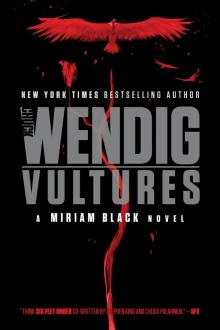 Vultures
Vultures Mockingbird
Mockingbird Wanderers
Wanderers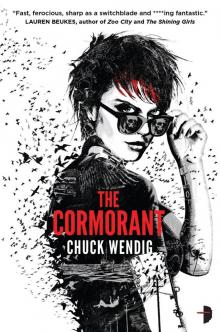 The Cormorant
The Cormorant Empire's End: Aftermath (Star Wars)
Empire's End: Aftermath (Star Wars)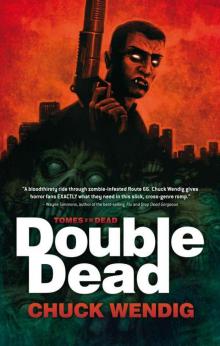 Double Dead
Double Dead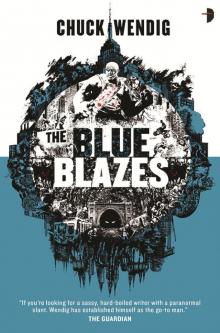 The Blue Blazes
The Blue Blazes 250 Things You Should Know About Writing
250 Things You Should Know About Writing Irregular Creatures
Irregular Creatures The Raptor & the Wren
The Raptor & the Wren Aftermath: Star Wars
Aftermath: Star Wars Blackbirds
Blackbirds The Hunt
The Hunt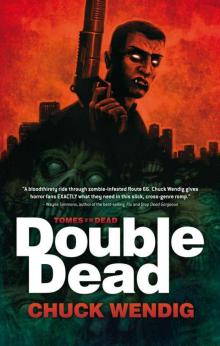 Tomes of the Dead (Book 1): Double Dead
Tomes of the Dead (Book 1): Double Dead Gods and Monsters: Unclean Spirits
Gods and Monsters: Unclean Spirits The Harvest
The Harvest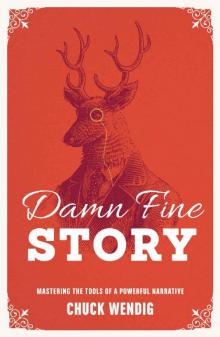 Damn Fine Story: Mastering the Tools of a Powerful Narrative
Damn Fine Story: Mastering the Tools of a Powerful Narrative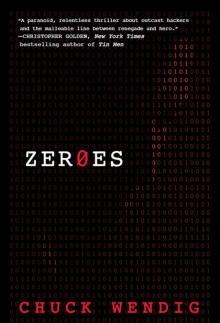 ZerOes
ZerOes Thunderbird
Thunderbird The Hellsblood Bride
The Hellsblood Bride Double Dead: Bad Blood
Double Dead: Bad Blood Life Debt
Life Debt